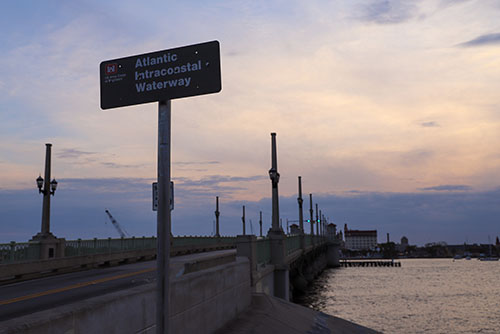By Gracie Gianoukos
Coastal sea level rising has drastically affected St. Augustine over the last decade and will continue to do so if citizens do not act on a federal, economical and personal level, according to Flagler College natural science professors.
Flagler College Professors Madeleine Doiron, Barbara Blonder and Karen Ford have witnessed and studied how sea level rising has affected St. Augustine during tidal storms and caused significant flooding over the years, especially downtown.
Madeleine Doiron, Visiting Assistant Professor in the Department of Natural Sciences, has been working at Flagler since 2016. She teaches a variety of science courses such as environmental science, biology, science communication and global change, which touches on sea level rising.
In St. Augustine, residents have seen an increase in tidal flooding within the last two years. There are concerns that the sea walls established to protect the city from flooding might be ineffective.
Sea level rise has several causes such as ice caps melting, fossil fuel emissions, and thermal expansion, which are all caused by anthropogenic factors, according to Doiron.
“When water warms up above four degrees Celsius it occupies more space,” Doiron said. “In order to decrease sea levels from rising, CO2 emissions must be limited. This comes down to pushing for major changes from policy makers in order to fund greener sources of energy.”
Doiron mentioned that individuals have a responsibility as well and it is important that people pay attention to their environmental footage. For example, flying once a year is a larger economical footprint when compared to a family in a developing country to sustain themselves.
“We can’t absolve ourselves of responsibility, we have to take responsibilities for our own actions and not just wait for the change to come,” Doiron said. “If everyone one is a drop in the bucket, eventually the bucket overflows.”
Barbara Blonder, St. Augustine City Commission Seat 2 and Associate Professor of Natural Sciences, has been working at Flagler for 18 years. She has personally experienced the devastations of flooding when Hurricane Matthew hit the East Coast and damaged her home.
“We see intense storm events on coastal ecosystems, and that is my research,” Blonder said. “The city definitely has a flooding issue.”
Blonder ran for the St. Augustine City Commission Seat 2 in the 2020 election. She stated that her students in her general environmental science course inspired her to run and helped her campaign.
“The primary reason why I ran for city commission is because we’ve never had a scientist in that position,” Blonder said. “I felt like I could bring a new perspective and a new set of priorities that might help address flood resiliency.”
In order to address the sea level rising, residents have to take measures to build architectural flooding resilience by elevating their houses and installing living shorelines. Residents should also change their behaviors in ways that reduce greenhouse gasses.
Blonder stresses that we have to raise awareness to get federal and state grant funding to address sea level rising. The upfront costs are an expensive investment, but if not addressed, it will become more expensive in the not-too-distant future.
“We don’t have to reinvent the wheel here; all we have to do is decide that it’s important enough to us,” Blonder said. “Everybody has a stake in this, I don’t care if you’re an art, digital media production, or sports management major. We are all affected by it.”
Karen Ford, Adjunct Professor of Natural Sciences, teaches one to two sections of environmental science at Flagler College each semester. Ford teaches her students about many things such as sustainable energy, pollution, and sea level rise.
Ford has observed the sunny day floods, hightides and surge storms and encourages others to make changes in their environmental decisions in order to prevent climate change and sea level rise. She states one important change is how citizens choose to vote as that determines how tax dollars are spent and the decision to incorporate renewable and green energy resources by the government.
“If you don’t start adding up every individual, you won’t get a large enough consensus to make a difference,” Ford said. “And there’s a lot of us.”



Be the first to comment on "Sea Level Rising in St. Augustine"